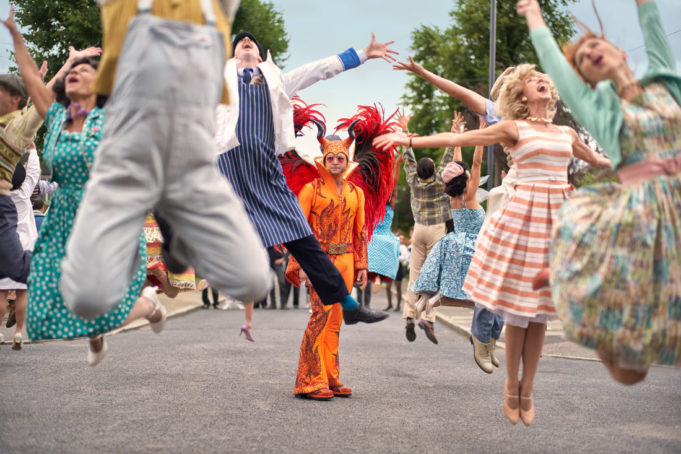It’s one of the less likely stories of rock history: How did a stocky, balding, bespectacled, obviously gay, not wildly good-looking piano player from dowdy Pinner, Middlesex named Reginald Dwight become Elton John, the global star who not only pulled off the difficult trick of rocking with a piano, but rocked so hard that even the straight boys had to groove to him? I was hoping that Rocketman, John’s officially sanctioned biopic, would answer that question, but no such luck. I would have settled for some insight into how that guy wrote “Bennie and the Jets” and “Goodbye Yellow Brick Road,” but the movie doesn’t give much on that count, either. What it does do is come up with some inspired stretches that seem taken directly from the imagination that spawned those songs.
The film opens with Elton (Taron Egerton) walking into a therapy group in full regalia, with a red sequined jumpsuit, horns, and wings, confessing to them about his various addictions to drugs, alcohol, sex, and shopping. This great device then becomes progressively clunkier as Elton narrates his life in flashback, his childhood with a cold absentee father (Steven Mackintosh) and a doting mother (Bryce Dallas Howard, unrecognizable with a black wig and a working-class British accent), his life-changing partnership with Bernie Taupin (Jamie Bell), his realization of his homosexuality, and his brushes with death as he descends into rock-star debauchery.
The movie starts out well, especially when Elton and the people in his life burst into song like they’re in a traditional musical. When 5-year-old Reg (Matthew Illesley, whose singing is dubbed by Sebastian Rich) leads his neighbors in a dance number to “The Bitch Is Back,” the boy is in full color while everyone else is in washed-out tones. Better still is “Saturday Night’s Alright (for Fighting),” which smoothly transitions from older Reg (Kit Connor) playing a gig in a rowdy pub to the adult Reg dancing at a carnival. Egerton is too tall and good-looking for the role, but he does his own singing quite well in stretches, and he’s a dynamic dancer. The title song features Elton’s younger self playing a toy piano at the bottom of a swimming pool, singing the song to him. Director Dexter Fletcher did uncredited work on Bohemian Rhapsody after the firing of Bryan Singer, but unlike in that film, here he lets himself cut loose. When Elton sings “Crocodile Rock” at his first American gig, both he and the entire audience levitate off the floor for a delirious, glorious moment. The further Fletcher dives into fantasy, the better his movie is.
Unfortunately, too often he and screenwriter Lee Hall (who collaborated with Elton John on the Broadway musical adaptation of Billy Elliot) lapse into the same cliches that Bohemian Rhapsody and a ton of other music biopics have indulged in about musicians’ tortured private lives. For all the attempts to make other characters sing the songs, there’s a tick-tock quality to the way Sir Elton’s biggest hits parade by. Each song might as well be introduced by the words, “And then I wrote [fill in the blank],” a cinematic formula that dates back to at least the 1940s. Taupin was an equal collaborator in the songwriting process, and some of the songs express his emotions more than Elton’s, but the movie reduces him to a bystander voicing concern over Elton’s drug use and being crapped on for it. The momentum from the movie’s first half dwindles to nothing.
Another issue is that Elton John has been so free about licensing his songs to films in the past that when “Tiny Dancer” strikes up, we can’t resist reflecting that it was used better in Almost Famous. The same goes for “Your Song” (Moulin Rouge!) and arguably for the title song (Battle of the Sexes). Egerton himself sang “I’m Still Standing” in Sing three years ago. The animated British film Gnomeo & Juliet made more inventive use of John’s body of work.
Paramount Pictures’ marketing material is trumpeting this as the first major Hollywood studio film to include a gay sex scene. The truth of that depends on how you define “major,” “gay,” and “sex scene” in that last sentence. Regardless, the film has little to say about being so publicly homosexual in an era when that wasn’t looked upon kindly, although Richard Madden (as Elton’s boyfriend and business manager John Reid) smolders well as an object of homoerotic desire. It’s the astronauts and rednecks and ballerinas running through Elton John’s imagination and across the screen that captivates us about Rocketman. It needed more of those, but the ones it gives us are nice to have.
Starring Taron Egerton and Richard Madden. Directed by Dexter Fletcher. Written by Lee Hall. Rated R.












